Papers by Amparo García-Carbonell
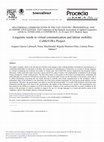
The market economy, which is the driving force behind recent changes in the working dynamics of b... more The market economy, which is the driving force behind recent changes in the working dynamics of businesses and institutions, is compelling stakeholders in education to facilitate the acquisition of communicative competency in a second or foreign language as a means of preparing the workforce for mobile or virtual work. The CoMoViWo project, financed by the European Union’s Education, Audiovisual and Culture Executive Agency (EACEA), aims to improve the employability of graduates by developing literacy training for virtual communication. The innovative aspect of this project is the fusion of communication, technology and multiculturality in association with business enterprises. The present study focuses on the first phase of the project, whose aim is to obtain information concerning the real needs detected in mobility and virtual communication in the workplace. After a preliminary study of the literature it was found that one of the most common instruments for carrying out needs analyses was the questionnaire. Therefore, the questionnaire was taken as a tool for the present study. As a result of the fieldwork carried out in the elaboration and filtering of the items in the questionnaire, the validity of the instrument was verified. The questionnaires were then piloted in the different companies involved in the project. Analysis of the results provided the necessary feedback for the design of the prototype of intensive modules to improve the use of a foreign language in a virtual and mobile context in the
workplace, which is the ultimate objective of the present project.
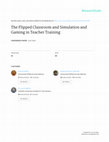
Experiencing first the power of simulation and gaming personally usually convinces teachers of th... more Experiencing first the power of simulation and gaming personally usually convinces teachers of the advantages of using the methodology. However, with the rapid expansion of the use of online technology, the balance of in-class and off-site-class time is changing and tilting towards online class preparation and follow-up activities by the students, thus giving rise to what has become known as the flipped classroom. This paper presents the perceptions of a group of post-graduate students on an experienced-based approach to teaching English as a Foreign Language through literature on a topic of high social impact. The innovation of the approach in the case of teacher training under study lies in the introduction to simulation and gaming methodology and the topic of human rights through the flipped classroom and the subsequent use of inclass time for scenario design as the main activity. Qualitative analysis of the opinions expressed in digital portfolios (N=71), presented after piloting the experience, revealed engaging results. The perceptions fell into three final categories: 1) Flipped classroom as a teaching model; 2) Scenario design for literature study in English; and 3) Addressing human rights through simulation.
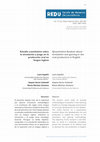
El presente trabajo nace de la inquietud
por aportar innovación metodológica
a la enseñanza del i... more El presente trabajo nace de la inquietud
por aportar innovación metodológica
a la enseñanza del inglés como lengua
extranjera y favorecer el óptimo desarrollo
de la producción oral. Este trabajo plantea
un estudio cuantitativo sobre la producción
oral en lengua inglesa mediante la
simulación y el juego como estrategia
docente. Persigue un doble objetivo:
comprobar si la simulación telemática es
una herramienta eficaz en la adquisición
de la expresión oral en lengua inglesa y
contribuir con la investigación que parte
desde la práctica en el aula de lenguas
para fines específicos. Se lleva a cabo un
estudio comparativo de las puntuaciones
pre y post-tratamiento obtenidas en la
evaluación global de la variable expresión
oral en los grupos experimentales E1 y
E2, se realiza un estudio comparativo de
las puntuaciones pre y post tratamiento
obtenidas en las sub-variables puesta
en escena, contenido, organización y
lengua, asociadas a la expresión oral y se
lleva a cabo un estudio de concordancia
entre los tres evaluadores externos pre
y post tratamiento. Tras los estudios,
los resultados obtenidos confirman que
existe una mejora significativa post-tratamiento
en la producción oral y en las
sub-variables contenido y organización; y
una mejora moderada en las subvariables
puesta en escena y lengua en los grupos
experimentales.
The present work seeks to provide
methodological innovation in the teaching
English as a foreign language and promote
an accurate development of oral abilities.
This article focuses on a quantitative
research about the development the oral
production in English by means of the
simulation and gaming methodology.
The objective of this research is two-fold:
first, to verify if a telematic simulation
proves the standards of an efficient tool
to develop the oral production in English,
and second, to delve into research from inclassroom
practice of English. Three studies
are conducted, namely, a comparative
analysis of the global assessment of the
variable oral expression pre and post
treatment in the experimental groups E1
and E2, a comparative study pre and post
treatment of the sub-variables delivery,
content, organization and language related
to the oral production, and a study of
concordance between three external
examiners. Results prove significant
progress in the variable oral production
post-treatment, and in the sub-variables
content and organization; a moderate
progress in the sub-variables delivery and
language use in the experimental groups.
This article will set the theoretical background on which CoMoViWo, an ongoing European project, ... more This article will set the theoretical background on which CoMoViWo, an ongoing European project, is based. First, the article critically analyses the concept of workplace language teaching and learning and the trends followed by current workplace language programs. A second focus of research analyses the changes that affect the literacy practices required in the new working context, which imply new ways of writing, speaking, and communicating through different media. A final consideration of the article addresses the role of English as a Lingua Franca, that is, English as a language currently used as a means of communication and interaction by speakers of different first languages.
Abstract
This article presents CoMoViWo, an ongoing European project that aims at modernizing ed... more Abstract
This article presents CoMoViWo, an ongoing European project that aims at modernizing education at Higher Education Institutions (HEIs), vocational institutions and enterprises in order to meet the needs of virtual and mobile work. The innovative character of this project is embedded in the combination of mobile and virtual communication, new technologies, multiculturalism and collaboration of and with enterprises. The difference phases of the project will undertake a review on communication literacy, the design of the virtual training modules, their piloting and their revision. The project results and outcomes will benefit the various actors dealing with virtual and mobile communication in multicultural environments and will also contribute to improve the employability needs of students and the success of enterprises in the global market.
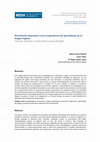
REDU
Abstract
This paper outlines the principles of simulation and gaming methodology and describes t... more Abstract
This paper outlines the principles of simulation and gaming methodology and describes the teaching
strategy of telematic simulation used with Spanish engineering students in a course of English as a
foreign language at advanced level. Telematic simulation creates an environment that allows
multidisciplinary groups of students from all over the world to interact; their language of
communication is English, with which they discuss, negotiate and reach agreements on topics of current
interest which are posed in the scenario. The effectiveness of the methodology in a specific context was
demonstrated in a quasi‐experimental study in which the improvements in reading comprehension,
listening comprehension, grammar and writing were measured. The results of the study provide the
A. García-Carbonell, F. Wattsy M.A. Andreu-Andrés. Simulación telemática como experiencia...
330022
evidence to affirm that this approach to teaching and learning can guarantee significant learning of
English at advanced level. The methodology encourages the experiential learning of the language and, at
the same time, entails the added value of the acquisition of professional competences.
Key words: Simulation and gaming methodology; experiential learning; language learning; telematic
simulation; competence acquisition.
Resumen
Este trabajo plantea los principios de la metodología de la simulación y juego y concretamente describe
la estrategia docente de la simulación telemática con estudiantes españoles de ingeniería, en una
asignatura de inglés como lengua extranjera de nivel avanzado. La simulación telemática crea un
entorno que permite interactuar a gran escala con grupos multidisciplinares de alumnos de todo el
mundo cuya lengua de comunicación es el inglés, con el que se debate, se negocia y se alcanzan
acuerdos sobre temas de actualidad que el escenario plantea. La efectividad de la metodología en un
contexto específico ha quedado demostrada en un estudio cuasi‐experimental, donde se mide la mejora
en la comprensión lectora, la comprensión auditiva, la gramática y la expresión escrita. Los resultados
del estudio proporcionan las evidencias para poder afirmar que estamos ante un enfoque didáctico que
puede garantizar el aprendizaje significativo de la lengua inglesa de nivel avanzado. El aprendizaje de la
lengua se propicia a través de la experiencia y, al mismo tiempo, se aporta el valor añadido de la
adquisición de competencias profesionales.
Palabras clave: Metodología de simulación y juego; aprendizaje a través de la experiencia; aprendizaje
de lenguas; simulación telemática; adquisición de competencias
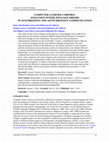
LANGUAGE LEARNING AND TECHNOLOGY
This study focuses on the computer-aided analysis of interlanguage errors made by the participant... more This study focuses on the computer-aided analysis of interlanguage errors made by the participants in the telematic simulation IDEELS (Intercultural Dynamics in European Education through on-Line Simulation). The synchronous and asynchronous communication analysed was part of the MiLC Corpus, a multilingual learner corpus of texts written by language learners from different language backgrounds. The main research questions centred on the differences in the amount and types of errors found in both the synchronous and asynchronous modes of communication, and whether different L1 groups committed certain errors more than their counterparts from other mother tongue backgrounds. As we hypothesised, more errors were found in the synchronous mode of communication than in the asynchronous; however, when examining the exact types of errors, some categories were more frequent in the synchronous mode (the formal and grammatical errors, among others), while in the asynchronous, errors of style and lexis occurred more frequently. A analysis of the data revealed that the frequency of error types varied with each different L1 group participating in the simulation, this same analysis also showed that highly relevant associations could be established the participants’ L1 and specific error types.

Uno de los grandes retos que afrontan los docentes universitarios que imparten lenguas extranjera... more Uno de los grandes retos que afrontan los docentes universitarios que imparten lenguas extranjeras es proveer de las herramientas y la práctica necesarias para que los alumnos alcancen no solo la tan demandada competencia comunicativa, sino que las destrezas interpersonales formen parte del proceso y del producto de enseñanza-aprendizaje. Desde el marco académico y profesional, diferentes organismos e instituciones así lo demandan. La Escuela Técnica Superior de Ingenieros de Telecomunicación de la UniversitatPolitècnica de València utiliza como estrategia docente la metodología de simulación y juego para la enseñanza del inglés. Futuros profesionales de la ingeniería se forman en lengua inglesa por medio de una simulación en tiempo real a gran escala. El presente estudio aporta los resultados de un análisis cualitativo sobre las percepciones de los participantes en una simulación telemática. El objetivo fundamental de esta investigación es conocer las fortalezas y debilidades que los participantes encuentran en la metodología de la simulación y juego. Los resultados obtenidos demuestran que los participantes en una simulación telemática muestran gran satisfacción con la metodología empleada, admiten haber mejorado en las destrezas de producción en lengua inglesa, al tiempo que adquieren competencias transversales.
One of the main challenges that teachers in foreign languages at tertiary level face concerns how to provide the tools and practice necessary to enhance communicative competence in the learners while also finding the way to develop interpersonal skills and make them a part of the teaching-learning process. Indeed, the fulfillment of this and other learning outcomes is demanded by academic and professional institutions alike. To this end, the school of Telecommunications Engineering of the UniversitatPolitècnica de València, Spain, uses the methodology of simulation and gaming in the English as a foreign language classes. Prospective engineers are trained in English by means of a large-scale telematic simulation in real time. This paper presents the results of the qualitative analysis of students’ perceptions of their participation in the telematic simulation. The objective of the research is to examine the strengths and weaknesses that students find in the simulation and gaming methodology. Results show that the participants in the telematic simulation experienced great satisfaction, improved their oral and written production skills and consolidated their interpersonal competences.
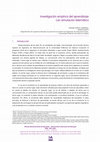
RIE
Desde principios de los años 90, los estudiantes de inglés, nivel avanzado, de la Escuela Técnica... more Desde principios de los años 90, los estudiantes de inglés, nivel avanzado, de la Escuela Técnica
Superior de Ingenieros de Telecomunicación de la Universidad Politécnica de Valencia incorporan al
programa oficial de la asignatura la simulación telemática a gran escala Project IDEALS, posteriormente
Project ICONS y Project IDEELS1. En todos ellos se parte de un escenario común, donde participantes de
diferentes disciplinas de todo el mundo tratan de debatir, negociar y llegar a acuerdos sobre un tema central
siguiendo una estricta agenda de trabajo. La comunicación entre los participantes está asistida por
ordenador y tiene lugar en tiempo real y diferido. El entusiasmo despertado en los alumnos por la nueva
experiencia hizo pensar que se trataba de una metodología con un fuerte potencial, por lo que la medición
de su eficacia como método de aprendizaje en el entorno específico del campo de la ingeniería se convierte
en prioridad. En la línea de los diferentes estudios2 realizados a lo largo de casi dos décadas, el trabajo que
aquí se presenta es investigación-acción que persigue una mayor calidad didáctica en el aula con un doble
objetivo. En primer lugar, probar la eficacia de la metodología de simulación y juego en la enseñanza del
inglés como lengua extranjera en un contexto técnico. En segundo lugar, que la simulación telemática es
una herramienta eficaz para mejorar las destrezas comunicativas, particularmente las macrodestrezas de la
comprensión lectora y expresión escrita.
El uso de la simulación en el aprendizaje de lenguas implica una serie de principios generales a
tener en cuenta. En primer lugar, toda simulación utilizada para este propósito ha de ser ejecutable y tener
en cuenta el objetivo de estudio. En segundo lugar, se ha de diseñar o adaptar de forma que la
comunicación sea un componente natural, sin que ésta quede desvirtuada por el uso de la tecnología. En
tercer lugar, el contenido no debe intimidar a los participantes o al profesor-facilitador, ni por el contrario,
aburrirles. Por último, la simulación debe respetar las necesidades lingüísticas del estudiante. Si estos
principios se traducen a términos de aprendizaje, se puede afirmar que el uso de la simulación en la
adquisición de una lengua ha de permitir que los participantes manipulen una gama de registros lingüísticos
y de vocabulario en un contexto o entorno concreto.
Abstract
The demand for quality training in the acquisition of communicative competence in Engli... more Abstract
The demand for quality training in the acquisition of communicative competence in English as a Foreign Language motivated the use of simulation and gaming methodology, specifically telematic simulation, with a cohort of engineering students. After the event, participants were polled by way of a Likert-type questionnaire and an open question. The objective of this paper is to report the findings of the qualitative analysis of the responses to the open question. The study of the students’ perceptions regarding telematic simulation shows that participants experienced satisfaction with the methodology, improved their oral and written production skills and consolidated their interpersonal skills.
Key words: communication skills, interpersonal skills, language learning, simulation and gaming, telematic simulation
where masters and students could exchange experience, share knowledge and embark on their own voy... more where masters and students could exchange experience, share knowledge and embark on their own voyage of discovery. It was a place where apprentices were the active element of the evolution of their knowledge; a place where it was possible to find co-teaching and co-learning at the same time. She brought together masters from different areas of game design, as well as students and professionals and guided them through the learning and game design experience. She put into practice the 2014 conference theme and inspired more than 250 students from more of 30 nations.
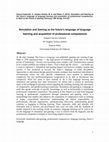
At the time Gaming: The Future's Language was published, gaming was coming of age. Duke in 1974 a... more At the time Gaming: The Future's Language was published, gaming was coming of age. Duke in 1974 announced that, "…the high priests of technology speak only to the high priests of technology". Society was becoming more complex and communication seemed to be a major problem (according to Duke, "God is dead and the citizen … can hardly get a word in edgewise"). Simulation and gaming hinged well between complex models and society; it was predicted to become the future's language of many disciplines. Approaches in educational design pointed towards strategies that immersed individuals in environments where not only specific competences were needed to understand complexity, but also professional/generic competences to be able to deconstruct that complexity. What few seem to have realised so far is that language learning and simulation and gaming have been forerunners for almost half a century in answering many of the pedagogical questions raised regarding the teaching, learning and assessment of competences, and gestalt learning in particular. Simulation and gaming is a language in itself that speaks vertically of specific knowledge, as well as horizontally in stimulating professional competence acquisition. The purpose of this chapter is to step from language learning to professional competences through simulation and gaming, which is a methodology that enables and enhances the acquisition of competences such as working in teams, crosscultural interaction, understanding the ethical responsibility of professionals, efficient negotiations, communicating effectively, understanding global solutions or engaging in lifelong learning. These capacities, skills and attitudes will ultimately lead to learners and practitioners that carry out tasks with the standards of quality required in the working world. In summary, language learning can be said to be, via the language of simulation and gaming, a way to achieve both the linguistic and the professional competences helpful in unraveling tangled scenarios.
Abstract
The demand for quality training in the acquisition of communicative competence in Eng... more Abstract
The demand for quality training in the acquisition of communicative competence in English as a Foreign Language motivated the use of simulation and gaming methodology, specifically telematic simulation, with a cohort of engineering students. After the event, participants were polled by way of a Likert-type questionnaire and an open question. The objective of this paper is to report the findings of the qualitative analysis of the responses to the open question. The study of t
he students’ perceptions regardin
g telematic simulation shows that participants experienced satisfaction with the methodology, improved their oral and written production skills and consolidated their interpersonal skills.
Key words:
communication skills, interpersonal skills, language learning, simulation and gaming
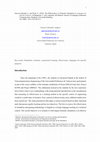
This paper pursues the testing of the hypothesis of the effectiveness of telematic simulation as ... more This paper pursues the testing of the hypothesis of the effectiveness of telematic simulation as a method to learn English as a foreign language (EFL) in a global multidisciplinary context. The study presents an experimental design based on the ICONS (International Communication and Negotiation Simulations) model, in which teams from all over the world participate in bilateral and multilateral negotiations in a synchronous and asynchronous format. The first quantitative analysis is a factorial analysis of inter- and intra-group variance (experimental and control) in which the progress in reading, listening, writing and grammar skills is measured. This first analysis compares the results within a group of all the skills at the same time. The second part of the experiment presents a mixed analysis of variance in which all the experimental groups and control groups form two subpopulations, comparing the global measures obtained, in order to determine the real effect of the teaching/learning method used. In addition to these three parametric analyses, the experimental groups were administered a qualitative survey with an aptitude questionnaire. The results obtained allow us to affirm that telematic simulation is a tool of extraordinary potential for the acquisition of a second language in a specific context and is a teaching method that guarantees meaningful learning.
The Innovation Competence Development (INCODE) Barometer is intended to aid in the development an... more The Innovation Competence Development (INCODE) Barometer is intended to aid in the development and assessment of innovation competence in a higher education setting. It can be used in self-assessment for formative purposes to engage students in directing their own learning through reflection on what innovation competence entails. Likewise, providing the opportunities for peer assessment in the process of learning within a course encourages collaborative learning and helps students learn to give and receive feedback. The INCODE Barometer can be used by the teacher from the design phase of a course to the different activities of formative assessment throughout the course and of summative assessment, in which decisions must be made regarding the achievement of learning objectives and the awarding of final grades.
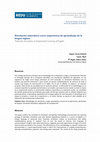
RESUMEN
Este trabajo plantea los principios de la metodología de la simulación y juego y concret... more RESUMEN
Este trabajo plantea los principios de la metodología de la simulación y juego y concretamente describe la
estrategia docente de la simulación telemática con estudiantes españoles de ingeniería, en una asignatura de
inglés como lengua extranjera de nivel avanzado. La simulación telemática crea un entorno que permite
interactuar a gran escala con grupos multidisciplinares de alumnos de todo el mundo cuya lengua de
comunicación es el inglés, con el que se debate, se negocia y se alcanzan acuerdos sobre temas de actualidad
que el escenario plantea. La efectividad de la metodología en un contexto específico ha quedado demostrada
en un estudio cuasi-experimental, donde se mide la mejora en la comprensión lectora, la comprensión
auditiva, la gramática y la expresión escrita. Los resultados del estudio proporcionan las evidencias para poder
afirmar que estamos ante un enfoque didáctico que puede garantizar el aprendizaje significativo de la lengua
inglesa de nivel avanzado. El aprendizaje de la lengua se propicia a través de la experiencia y, al mismo
tiempo, se aporta el valor añadido de la adquisición de competencias profesionales.
ABSTRACT
Telematic Simulation as Experiential Learning of English.
This paper outlines the principles of simulation and gaming methodology and describes the teaching strategy of
telematic simulation used with Spanish engineering students in a course of English as a foreign language at
advanced level. Telematic simulation creates an environment that allows multidisciplinary groups of students
from all over the world to interact; their language of communication is English, with which they discuss,
negotiate and reach agreements on topics of current interest which are posed in the scenario. The
effectiveness of the methodology in a specific context was demonstrated in a quasi-experimental study in
which the improvements in reading comprehension, listening comprehension, grammar and writing were
measured. The results of the study provide the evidence to affirm that this approach to teaching and learning
can guarantee significant learning of English at advanced level. The methodology encourages the experiential
learning of the language and, at the same time, entails the added value of the acquisition of professional
competences.
"Abstract
Student work groups in higher education are not always operational; teachers should us... more "Abstract
Student work groups in higher education are not always operational; teachers should use methods for the early detection of dysfunctions to help remedy deficiencies that hamper group effectiveness. We have found that polling at different moments in an activity is instrumental in spurring groups to correct their shortcomings. This paper presents the perceptions of a cohort of engineering students, whose group work was improved as a result of polling during a telematic simulation with student teams from
other countries. Qualitative analysis of the students’ personal reflections shows that several factors were related to active participation and group effectiveness. These included greater familiarity among members, awareness of group performance,
efficient inter- and intra-group communication, suitable task distribution and work organization."
Working Papers on Operations Management . Vol 3, Nº 1 (61-70)
Abstract: This paper addresses the development and validation of rubrics, materials and situation... more Abstract: This paper addresses the development and validation of rubrics, materials and situations for the assessment of innovation competence. Research was carried out to verify the viability of the first draft of the assessment criteria, which led to refinement of the criteria and proposals to enhance the ensuing validation process that will include students and raters of different language backgrounds. Keywords: innovation competence; assessment; rubrics
El cada vez más extendido uso de las metodologías activas de aprendizaje en el aula de lenguas ex... more El cada vez más extendido uso de las metodologías activas de aprendizaje en el aula de lenguas extranjeras obliga a los profesores a prestar atención a cómo se evalúan los resultados de aprendizaje. Este trabajo examinará la relación entre objetivos de aprendizaje, la metodología y la evaluación y se centrará en formas de llevar a cabo la medición de la actuación del alumno cuando se utiliza un enfoque de aprendizaje activo.
The increasingly widespread use of active learning methodology in the foreign language classroom requires teachers to pay special attention to how learning outcomes are assessed. This paper will review the relationship between learning objectives, methodology and assessment and will focus on several ways of conducting measurements of student performance when using an active learning approach.







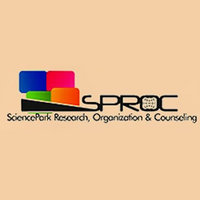


Uploads
Papers by Amparo García-Carbonell
workplace, which is the ultimate objective of the present project.
por aportar innovación metodológica
a la enseñanza del inglés como lengua
extranjera y favorecer el óptimo desarrollo
de la producción oral. Este trabajo plantea
un estudio cuantitativo sobre la producción
oral en lengua inglesa mediante la
simulación y el juego como estrategia
docente. Persigue un doble objetivo:
comprobar si la simulación telemática es
una herramienta eficaz en la adquisición
de la expresión oral en lengua inglesa y
contribuir con la investigación que parte
desde la práctica en el aula de lenguas
para fines específicos. Se lleva a cabo un
estudio comparativo de las puntuaciones
pre y post-tratamiento obtenidas en la
evaluación global de la variable expresión
oral en los grupos experimentales E1 y
E2, se realiza un estudio comparativo de
las puntuaciones pre y post tratamiento
obtenidas en las sub-variables puesta
en escena, contenido, organización y
lengua, asociadas a la expresión oral y se
lleva a cabo un estudio de concordancia
entre los tres evaluadores externos pre
y post tratamiento. Tras los estudios,
los resultados obtenidos confirman que
existe una mejora significativa post-tratamiento
en la producción oral y en las
sub-variables contenido y organización; y
una mejora moderada en las subvariables
puesta en escena y lengua en los grupos
experimentales.
The present work seeks to provide
methodological innovation in the teaching
English as a foreign language and promote
an accurate development of oral abilities.
This article focuses on a quantitative
research about the development the oral
production in English by means of the
simulation and gaming methodology.
The objective of this research is two-fold:
first, to verify if a telematic simulation
proves the standards of an efficient tool
to develop the oral production in English,
and second, to delve into research from inclassroom
practice of English. Three studies
are conducted, namely, a comparative
analysis of the global assessment of the
variable oral expression pre and post
treatment in the experimental groups E1
and E2, a comparative study pre and post
treatment of the sub-variables delivery,
content, organization and language related
to the oral production, and a study of
concordance between three external
examiners. Results prove significant
progress in the variable oral production
post-treatment, and in the sub-variables
content and organization; a moderate
progress in the sub-variables delivery and
language use in the experimental groups.
This article presents CoMoViWo, an ongoing European project that aims at modernizing education at Higher Education Institutions (HEIs), vocational institutions and enterprises in order to meet the needs of virtual and mobile work. The innovative character of this project is embedded in the combination of mobile and virtual communication, new technologies, multiculturalism and collaboration of and with enterprises. The difference phases of the project will undertake a review on communication literacy, the design of the virtual training modules, their piloting and their revision. The project results and outcomes will benefit the various actors dealing with virtual and mobile communication in multicultural environments and will also contribute to improve the employability needs of students and the success of enterprises in the global market.
This paper outlines the principles of simulation and gaming methodology and describes the teaching
strategy of telematic simulation used with Spanish engineering students in a course of English as a
foreign language at advanced level. Telematic simulation creates an environment that allows
multidisciplinary groups of students from all over the world to interact; their language of
communication is English, with which they discuss, negotiate and reach agreements on topics of current
interest which are posed in the scenario. The effectiveness of the methodology in a specific context was
demonstrated in a quasi‐experimental study in which the improvements in reading comprehension,
listening comprehension, grammar and writing were measured. The results of the study provide the
A. García-Carbonell, F. Wattsy M.A. Andreu-Andrés. Simulación telemática como experiencia...
330022
evidence to affirm that this approach to teaching and learning can guarantee significant learning of
English at advanced level. The methodology encourages the experiential learning of the language and, at
the same time, entails the added value of the acquisition of professional competences.
Key words: Simulation and gaming methodology; experiential learning; language learning; telematic
simulation; competence acquisition.
Resumen
Este trabajo plantea los principios de la metodología de la simulación y juego y concretamente describe
la estrategia docente de la simulación telemática con estudiantes españoles de ingeniería, en una
asignatura de inglés como lengua extranjera de nivel avanzado. La simulación telemática crea un
entorno que permite interactuar a gran escala con grupos multidisciplinares de alumnos de todo el
mundo cuya lengua de comunicación es el inglés, con el que se debate, se negocia y se alcanzan
acuerdos sobre temas de actualidad que el escenario plantea. La efectividad de la metodología en un
contexto específico ha quedado demostrada en un estudio cuasi‐experimental, donde se mide la mejora
en la comprensión lectora, la comprensión auditiva, la gramática y la expresión escrita. Los resultados
del estudio proporcionan las evidencias para poder afirmar que estamos ante un enfoque didáctico que
puede garantizar el aprendizaje significativo de la lengua inglesa de nivel avanzado. El aprendizaje de la
lengua se propicia a través de la experiencia y, al mismo tiempo, se aporta el valor añadido de la
adquisición de competencias profesionales.
Palabras clave: Metodología de simulación y juego; aprendizaje a través de la experiencia; aprendizaje
de lenguas; simulación telemática; adquisición de competencias
One of the main challenges that teachers in foreign languages at tertiary level face concerns how to provide the tools and practice necessary to enhance communicative competence in the learners while also finding the way to develop interpersonal skills and make them a part of the teaching-learning process. Indeed, the fulfillment of this and other learning outcomes is demanded by academic and professional institutions alike. To this end, the school of Telecommunications Engineering of the UniversitatPolitècnica de València, Spain, uses the methodology of simulation and gaming in the English as a foreign language classes. Prospective engineers are trained in English by means of a large-scale telematic simulation in real time. This paper presents the results of the qualitative analysis of students’ perceptions of their participation in the telematic simulation. The objective of the research is to examine the strengths and weaknesses that students find in the simulation and gaming methodology. Results show that the participants in the telematic simulation experienced great satisfaction, improved their oral and written production skills and consolidated their interpersonal competences.
Superior de Ingenieros de Telecomunicación de la Universidad Politécnica de Valencia incorporan al
programa oficial de la asignatura la simulación telemática a gran escala Project IDEALS, posteriormente
Project ICONS y Project IDEELS1. En todos ellos se parte de un escenario común, donde participantes de
diferentes disciplinas de todo el mundo tratan de debatir, negociar y llegar a acuerdos sobre un tema central
siguiendo una estricta agenda de trabajo. La comunicación entre los participantes está asistida por
ordenador y tiene lugar en tiempo real y diferido. El entusiasmo despertado en los alumnos por la nueva
experiencia hizo pensar que se trataba de una metodología con un fuerte potencial, por lo que la medición
de su eficacia como método de aprendizaje en el entorno específico del campo de la ingeniería se convierte
en prioridad. En la línea de los diferentes estudios2 realizados a lo largo de casi dos décadas, el trabajo que
aquí se presenta es investigación-acción que persigue una mayor calidad didáctica en el aula con un doble
objetivo. En primer lugar, probar la eficacia de la metodología de simulación y juego en la enseñanza del
inglés como lengua extranjera en un contexto técnico. En segundo lugar, que la simulación telemática es
una herramienta eficaz para mejorar las destrezas comunicativas, particularmente las macrodestrezas de la
comprensión lectora y expresión escrita.
El uso de la simulación en el aprendizaje de lenguas implica una serie de principios generales a
tener en cuenta. En primer lugar, toda simulación utilizada para este propósito ha de ser ejecutable y tener
en cuenta el objetivo de estudio. En segundo lugar, se ha de diseñar o adaptar de forma que la
comunicación sea un componente natural, sin que ésta quede desvirtuada por el uso de la tecnología. En
tercer lugar, el contenido no debe intimidar a los participantes o al profesor-facilitador, ni por el contrario,
aburrirles. Por último, la simulación debe respetar las necesidades lingüísticas del estudiante. Si estos
principios se traducen a términos de aprendizaje, se puede afirmar que el uso de la simulación en la
adquisición de una lengua ha de permitir que los participantes manipulen una gama de registros lingüísticos
y de vocabulario en un contexto o entorno concreto.
The demand for quality training in the acquisition of communicative competence in English as a Foreign Language motivated the use of simulation and gaming methodology, specifically telematic simulation, with a cohort of engineering students. After the event, participants were polled by way of a Likert-type questionnaire and an open question. The objective of this paper is to report the findings of the qualitative analysis of the responses to the open question. The study of the students’ perceptions regarding telematic simulation shows that participants experienced satisfaction with the methodology, improved their oral and written production skills and consolidated their interpersonal skills.
Key words: communication skills, interpersonal skills, language learning, simulation and gaming, telematic simulation
The demand for quality training in the acquisition of communicative competence in English as a Foreign Language motivated the use of simulation and gaming methodology, specifically telematic simulation, with a cohort of engineering students. After the event, participants were polled by way of a Likert-type questionnaire and an open question. The objective of this paper is to report the findings of the qualitative analysis of the responses to the open question. The study of t
he students’ perceptions regardin
g telematic simulation shows that participants experienced satisfaction with the methodology, improved their oral and written production skills and consolidated their interpersonal skills.
Key words:
communication skills, interpersonal skills, language learning, simulation and gaming
Este trabajo plantea los principios de la metodología de la simulación y juego y concretamente describe la
estrategia docente de la simulación telemática con estudiantes españoles de ingeniería, en una asignatura de
inglés como lengua extranjera de nivel avanzado. La simulación telemática crea un entorno que permite
interactuar a gran escala con grupos multidisciplinares de alumnos de todo el mundo cuya lengua de
comunicación es el inglés, con el que se debate, se negocia y se alcanzan acuerdos sobre temas de actualidad
que el escenario plantea. La efectividad de la metodología en un contexto específico ha quedado demostrada
en un estudio cuasi-experimental, donde se mide la mejora en la comprensión lectora, la comprensión
auditiva, la gramática y la expresión escrita. Los resultados del estudio proporcionan las evidencias para poder
afirmar que estamos ante un enfoque didáctico que puede garantizar el aprendizaje significativo de la lengua
inglesa de nivel avanzado. El aprendizaje de la lengua se propicia a través de la experiencia y, al mismo
tiempo, se aporta el valor añadido de la adquisición de competencias profesionales.
ABSTRACT
Telematic Simulation as Experiential Learning of English.
This paper outlines the principles of simulation and gaming methodology and describes the teaching strategy of
telematic simulation used with Spanish engineering students in a course of English as a foreign language at
advanced level. Telematic simulation creates an environment that allows multidisciplinary groups of students
from all over the world to interact; their language of communication is English, with which they discuss,
negotiate and reach agreements on topics of current interest which are posed in the scenario. The
effectiveness of the methodology in a specific context was demonstrated in a quasi-experimental study in
which the improvements in reading comprehension, listening comprehension, grammar and writing were
measured. The results of the study provide the evidence to affirm that this approach to teaching and learning
can guarantee significant learning of English at advanced level. The methodology encourages the experiential
learning of the language and, at the same time, entails the added value of the acquisition of professional
competences.
Student work groups in higher education are not always operational; teachers should use methods for the early detection of dysfunctions to help remedy deficiencies that hamper group effectiveness. We have found that polling at different moments in an activity is instrumental in spurring groups to correct their shortcomings. This paper presents the perceptions of a cohort of engineering students, whose group work was improved as a result of polling during a telematic simulation with student teams from
other countries. Qualitative analysis of the students’ personal reflections shows that several factors were related to active participation and group effectiveness. These included greater familiarity among members, awareness of group performance,
efficient inter- and intra-group communication, suitable task distribution and work organization."
The increasingly widespread use of active learning methodology in the foreign language classroom requires teachers to pay special attention to how learning outcomes are assessed. This paper will review the relationship between learning objectives, methodology and assessment and will focus on several ways of conducting measurements of student performance when using an active learning approach.
workplace, which is the ultimate objective of the present project.
por aportar innovación metodológica
a la enseñanza del inglés como lengua
extranjera y favorecer el óptimo desarrollo
de la producción oral. Este trabajo plantea
un estudio cuantitativo sobre la producción
oral en lengua inglesa mediante la
simulación y el juego como estrategia
docente. Persigue un doble objetivo:
comprobar si la simulación telemática es
una herramienta eficaz en la adquisición
de la expresión oral en lengua inglesa y
contribuir con la investigación que parte
desde la práctica en el aula de lenguas
para fines específicos. Se lleva a cabo un
estudio comparativo de las puntuaciones
pre y post-tratamiento obtenidas en la
evaluación global de la variable expresión
oral en los grupos experimentales E1 y
E2, se realiza un estudio comparativo de
las puntuaciones pre y post tratamiento
obtenidas en las sub-variables puesta
en escena, contenido, organización y
lengua, asociadas a la expresión oral y se
lleva a cabo un estudio de concordancia
entre los tres evaluadores externos pre
y post tratamiento. Tras los estudios,
los resultados obtenidos confirman que
existe una mejora significativa post-tratamiento
en la producción oral y en las
sub-variables contenido y organización; y
una mejora moderada en las subvariables
puesta en escena y lengua en los grupos
experimentales.
The present work seeks to provide
methodological innovation in the teaching
English as a foreign language and promote
an accurate development of oral abilities.
This article focuses on a quantitative
research about the development the oral
production in English by means of the
simulation and gaming methodology.
The objective of this research is two-fold:
first, to verify if a telematic simulation
proves the standards of an efficient tool
to develop the oral production in English,
and second, to delve into research from inclassroom
practice of English. Three studies
are conducted, namely, a comparative
analysis of the global assessment of the
variable oral expression pre and post
treatment in the experimental groups E1
and E2, a comparative study pre and post
treatment of the sub-variables delivery,
content, organization and language related
to the oral production, and a study of
concordance between three external
examiners. Results prove significant
progress in the variable oral production
post-treatment, and in the sub-variables
content and organization; a moderate
progress in the sub-variables delivery and
language use in the experimental groups.
This article presents CoMoViWo, an ongoing European project that aims at modernizing education at Higher Education Institutions (HEIs), vocational institutions and enterprises in order to meet the needs of virtual and mobile work. The innovative character of this project is embedded in the combination of mobile and virtual communication, new technologies, multiculturalism and collaboration of and with enterprises. The difference phases of the project will undertake a review on communication literacy, the design of the virtual training modules, their piloting and their revision. The project results and outcomes will benefit the various actors dealing with virtual and mobile communication in multicultural environments and will also contribute to improve the employability needs of students and the success of enterprises in the global market.
This paper outlines the principles of simulation and gaming methodology and describes the teaching
strategy of telematic simulation used with Spanish engineering students in a course of English as a
foreign language at advanced level. Telematic simulation creates an environment that allows
multidisciplinary groups of students from all over the world to interact; their language of
communication is English, with which they discuss, negotiate and reach agreements on topics of current
interest which are posed in the scenario. The effectiveness of the methodology in a specific context was
demonstrated in a quasi‐experimental study in which the improvements in reading comprehension,
listening comprehension, grammar and writing were measured. The results of the study provide the
A. García-Carbonell, F. Wattsy M.A. Andreu-Andrés. Simulación telemática como experiencia...
330022
evidence to affirm that this approach to teaching and learning can guarantee significant learning of
English at advanced level. The methodology encourages the experiential learning of the language and, at
the same time, entails the added value of the acquisition of professional competences.
Key words: Simulation and gaming methodology; experiential learning; language learning; telematic
simulation; competence acquisition.
Resumen
Este trabajo plantea los principios de la metodología de la simulación y juego y concretamente describe
la estrategia docente de la simulación telemática con estudiantes españoles de ingeniería, en una
asignatura de inglés como lengua extranjera de nivel avanzado. La simulación telemática crea un
entorno que permite interactuar a gran escala con grupos multidisciplinares de alumnos de todo el
mundo cuya lengua de comunicación es el inglés, con el que se debate, se negocia y se alcanzan
acuerdos sobre temas de actualidad que el escenario plantea. La efectividad de la metodología en un
contexto específico ha quedado demostrada en un estudio cuasi‐experimental, donde se mide la mejora
en la comprensión lectora, la comprensión auditiva, la gramática y la expresión escrita. Los resultados
del estudio proporcionan las evidencias para poder afirmar que estamos ante un enfoque didáctico que
puede garantizar el aprendizaje significativo de la lengua inglesa de nivel avanzado. El aprendizaje de la
lengua se propicia a través de la experiencia y, al mismo tiempo, se aporta el valor añadido de la
adquisición de competencias profesionales.
Palabras clave: Metodología de simulación y juego; aprendizaje a través de la experiencia; aprendizaje
de lenguas; simulación telemática; adquisición de competencias
One of the main challenges that teachers in foreign languages at tertiary level face concerns how to provide the tools and practice necessary to enhance communicative competence in the learners while also finding the way to develop interpersonal skills and make them a part of the teaching-learning process. Indeed, the fulfillment of this and other learning outcomes is demanded by academic and professional institutions alike. To this end, the school of Telecommunications Engineering of the UniversitatPolitècnica de València, Spain, uses the methodology of simulation and gaming in the English as a foreign language classes. Prospective engineers are trained in English by means of a large-scale telematic simulation in real time. This paper presents the results of the qualitative analysis of students’ perceptions of their participation in the telematic simulation. The objective of the research is to examine the strengths and weaknesses that students find in the simulation and gaming methodology. Results show that the participants in the telematic simulation experienced great satisfaction, improved their oral and written production skills and consolidated their interpersonal competences.
Superior de Ingenieros de Telecomunicación de la Universidad Politécnica de Valencia incorporan al
programa oficial de la asignatura la simulación telemática a gran escala Project IDEALS, posteriormente
Project ICONS y Project IDEELS1. En todos ellos se parte de un escenario común, donde participantes de
diferentes disciplinas de todo el mundo tratan de debatir, negociar y llegar a acuerdos sobre un tema central
siguiendo una estricta agenda de trabajo. La comunicación entre los participantes está asistida por
ordenador y tiene lugar en tiempo real y diferido. El entusiasmo despertado en los alumnos por la nueva
experiencia hizo pensar que se trataba de una metodología con un fuerte potencial, por lo que la medición
de su eficacia como método de aprendizaje en el entorno específico del campo de la ingeniería se convierte
en prioridad. En la línea de los diferentes estudios2 realizados a lo largo de casi dos décadas, el trabajo que
aquí se presenta es investigación-acción que persigue una mayor calidad didáctica en el aula con un doble
objetivo. En primer lugar, probar la eficacia de la metodología de simulación y juego en la enseñanza del
inglés como lengua extranjera en un contexto técnico. En segundo lugar, que la simulación telemática es
una herramienta eficaz para mejorar las destrezas comunicativas, particularmente las macrodestrezas de la
comprensión lectora y expresión escrita.
El uso de la simulación en el aprendizaje de lenguas implica una serie de principios generales a
tener en cuenta. En primer lugar, toda simulación utilizada para este propósito ha de ser ejecutable y tener
en cuenta el objetivo de estudio. En segundo lugar, se ha de diseñar o adaptar de forma que la
comunicación sea un componente natural, sin que ésta quede desvirtuada por el uso de la tecnología. En
tercer lugar, el contenido no debe intimidar a los participantes o al profesor-facilitador, ni por el contrario,
aburrirles. Por último, la simulación debe respetar las necesidades lingüísticas del estudiante. Si estos
principios se traducen a términos de aprendizaje, se puede afirmar que el uso de la simulación en la
adquisición de una lengua ha de permitir que los participantes manipulen una gama de registros lingüísticos
y de vocabulario en un contexto o entorno concreto.
The demand for quality training in the acquisition of communicative competence in English as a Foreign Language motivated the use of simulation and gaming methodology, specifically telematic simulation, with a cohort of engineering students. After the event, participants were polled by way of a Likert-type questionnaire and an open question. The objective of this paper is to report the findings of the qualitative analysis of the responses to the open question. The study of the students’ perceptions regarding telematic simulation shows that participants experienced satisfaction with the methodology, improved their oral and written production skills and consolidated their interpersonal skills.
Key words: communication skills, interpersonal skills, language learning, simulation and gaming, telematic simulation
The demand for quality training in the acquisition of communicative competence in English as a Foreign Language motivated the use of simulation and gaming methodology, specifically telematic simulation, with a cohort of engineering students. After the event, participants were polled by way of a Likert-type questionnaire and an open question. The objective of this paper is to report the findings of the qualitative analysis of the responses to the open question. The study of t
he students’ perceptions regardin
g telematic simulation shows that participants experienced satisfaction with the methodology, improved their oral and written production skills and consolidated their interpersonal skills.
Key words:
communication skills, interpersonal skills, language learning, simulation and gaming
Este trabajo plantea los principios de la metodología de la simulación y juego y concretamente describe la
estrategia docente de la simulación telemática con estudiantes españoles de ingeniería, en una asignatura de
inglés como lengua extranjera de nivel avanzado. La simulación telemática crea un entorno que permite
interactuar a gran escala con grupos multidisciplinares de alumnos de todo el mundo cuya lengua de
comunicación es el inglés, con el que se debate, se negocia y se alcanzan acuerdos sobre temas de actualidad
que el escenario plantea. La efectividad de la metodología en un contexto específico ha quedado demostrada
en un estudio cuasi-experimental, donde se mide la mejora en la comprensión lectora, la comprensión
auditiva, la gramática y la expresión escrita. Los resultados del estudio proporcionan las evidencias para poder
afirmar que estamos ante un enfoque didáctico que puede garantizar el aprendizaje significativo de la lengua
inglesa de nivel avanzado. El aprendizaje de la lengua se propicia a través de la experiencia y, al mismo
tiempo, se aporta el valor añadido de la adquisición de competencias profesionales.
ABSTRACT
Telematic Simulation as Experiential Learning of English.
This paper outlines the principles of simulation and gaming methodology and describes the teaching strategy of
telematic simulation used with Spanish engineering students in a course of English as a foreign language at
advanced level. Telematic simulation creates an environment that allows multidisciplinary groups of students
from all over the world to interact; their language of communication is English, with which they discuss,
negotiate and reach agreements on topics of current interest which are posed in the scenario. The
effectiveness of the methodology in a specific context was demonstrated in a quasi-experimental study in
which the improvements in reading comprehension, listening comprehension, grammar and writing were
measured. The results of the study provide the evidence to affirm that this approach to teaching and learning
can guarantee significant learning of English at advanced level. The methodology encourages the experiential
learning of the language and, at the same time, entails the added value of the acquisition of professional
competences.
Student work groups in higher education are not always operational; teachers should use methods for the early detection of dysfunctions to help remedy deficiencies that hamper group effectiveness. We have found that polling at different moments in an activity is instrumental in spurring groups to correct their shortcomings. This paper presents the perceptions of a cohort of engineering students, whose group work was improved as a result of polling during a telematic simulation with student teams from
other countries. Qualitative analysis of the students’ personal reflections shows that several factors were related to active participation and group effectiveness. These included greater familiarity among members, awareness of group performance,
efficient inter- and intra-group communication, suitable task distribution and work organization."
The increasingly widespread use of active learning methodology in the foreign language classroom requires teachers to pay special attention to how learning outcomes are assessed. This paper will review the relationship between learning objectives, methodology and assessment and will focus on several ways of conducting measurements of student performance when using an active learning approach.